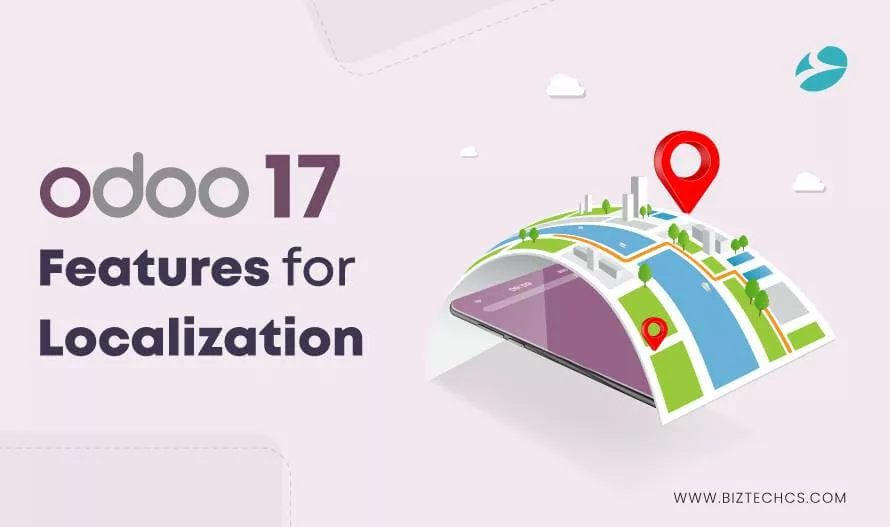2786
Odoo 17 features for localization: All You Have to Know
18 Oct, 2023
7 min read
2786
18 Oct, 2023
7 min read

Working with an ERP system becomes especially tricky when businesses have to abide by local guidelines, legal and regulatory requirements, and so on. While most ERPs tend to comply with the global standard of business practice, adjusting to localization isn’t always supported.
But with Odoo localization, you can tap into the local and global market seamlessly and meet the specific legal, regulatory, and business requirements of a particular country, region, or market.
Localization is essential for businesses operating in diverse locations because each jurisdiction may have unique tax laws, accounting practices, currencies, languages, and reporting standards.
Key aspects of Odoo localization include:
With the release of Odoo 17 this November, you can expect some phenomenal new additions that are to take your localization game to a whole new level.
Let’s check what you can expect with Odoo 17!
Read Also: Launch of Odoo 17 – Keynote by Fabien Pinckaers
Argentina:
Mexico:
United Kingdom:
Tax names updated.
Tunisia:
The Base Localization package has been incorporated, featuring chart of accounts, tax configurations, fiscal positions, balance sheet, profit and loss report, and tax report.
Mozambique:
Included the Base Localization package, encompassing chart of accounts, fiscal positions, taxes, balance sheet, profit and loss report, and tax report.
Belgium:
Payroll: Enhance the visibility of cost-related details for company cars within the salary configurator.
Chile:
Brazil:
Incorporated the Central Bank of Brazil as a currency rate provider.
Denmark, Lithuania:
Introduced the SAF-T report and a revised chart of accounts, subsequently aligning tax configurations with these updates.
Ecuador:
Profit and loss and balance sheets were added.
France:
Tax reports now include fiscal roundings in the Odoo localization module.
Greece, Ireland, Estonia, Kazakhstan, and Algeria:
A base localization package is added with features like fiscal positions, balance sheet, chart of accounts, taxes, profit and loss report, and tax report.
Poland:
Tax report implemented.
Romania:
Singapore:
Pay Now QRCodes are now added to invoices.
Spain:
Vietnam:
VietQR Code is now added to Invoices.
Dominican Republic:
Localization updated. Tax and financial reports added.
Hong Kong:
Addition of FPS QR codes to Invoices.
Latvia, Morocco:
A base localization package is added in financial accounting with Odoo 17 that includes features like VAT reports, taxes, chart of accounts, and fiscal positions.
Peru:
Philipines:
Taxes and charts of accounts updated in the new Odoo 17 update.
Colombia:
Financial reports and taxes updated.
Kenya:
Malaysia:
Taxes and chart of accounts are improved.
Serbia:
In Odoo Accounting localization, reports and the chart of accounts are translated. The Storno accounting is also activated by default.
Venezuela:
The Odoo accounting software has implemented VAT validation as per the Venezuelan TIN format.
These localization features of various countries elevate the overall Odoo website development experience of businesses. It helps them abide by their local legal and regulatory requirements while ensuring maximum productivity and profitability from their business processes.
The release of Odoo 17 further strengthens your localization challenges by bringing in a plethora of new features.
Want to learn more about what to expect from Odoo 17? Keep an eye on this space and we shall help you with the latest updates of Odoo 17.
Thinking of adopting an ERP as agile as Odoo? Our team can help you with that! Whether it is to install Odoo locally, implement Odoo Cloud, migrate from legacy systems, or perform Odoo customization, BiztechCS has a dedicated team of Odoo experts to help in every aspect.
Regardless of the industry you are serving, be it Odoo trading, eCommerce, or any other, our Odoo experts can help transform your business digitally while staying compliant with the various rules and regulations.
Read More: How Odoo 17 Can Elevate Trading Enterprises?
Odoo 17’s localization features are a testament to its commitment to supporting businesses worldwide. With its versatile tools for adapting to diverse markets, managing tax compliance, and ensuring legal requirements are met, Odoo 17 empowers businesses to expand globally with confidence.
From accounting standards to tax regulations, Odoo 17 has it all covered, allowing businesses to focus on growth and success while Odoo takes care of the localization complexities. In this ever-connected world, Odoo 17 is the bridge that connects businesses to international opportunities, making it a crucial asset for companies aiming for global reach and success.

Development
243
By Devik Gondaliya
09 Jul, 2025

Odoo
7876
By Biztech
04 Jul, 2025
Odoo
523
By Devik Gondaliya
02 Jul, 2025